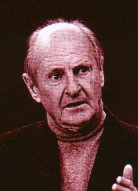Bruno Snell
Bruno Snell ( born June 18, 1896 in Hildesheim, † 31 October 1986 in Hamburg) was a philologist Classic ( Greek, Latin). He was the son of the psychiatrist Otto Snell ( 1859-1939 ).
Life
The graduate of Johanneums Lüneburg first studied law and economics in Edinburgh and Oxford, but then turned to the study of classical philology in Leiden, Berlin, Munich and Göttingen. After receiving his doctorate in 1922 in Göttingen, he habilitated in 1925 at the University of Hamburg: The spiritual position of Aeschylus' tragedy. He then went as a German lecturer to Pisa. From 1931 to 1959 he held the Chair of Classical Philology in Hamburg. In 1944, he founded there the still -working Research Centre " Thesaurus Linguae Graecae ".
Bruno Snell: "Our European thinking on lifts among the Greeks. (...) This relation of language to the scientific concept formation can be, strictly speaking, observed only at the Greek, because only here the terms are organically grown out of language: only in Greece, the theoretical consciousness has arisen independently, ... all other languages live off thereof, have borrowed, translated the Received further training. "
Addition, the determined opponents of National Socialism from 1945 directed until 1946 as the first dean after the Second World War, the Faculty of Arts and from 1951 to 1953 he stood in front of the university as Rector. In addition, he played a major role in the establishment Joachim- Jungius Society of Science in 1947 and the founding of the Mommsen -Gesellschaft 1950. Moreover, the Europa-Kolleg Hamburg was founded on Snell's initiative in 1953. Snell also was a leading figure in the Hamburg office of the Congress for Cultural Freedom.
Snell's work is characterized by meticulous metric analysis and in-depth consideration of papyrus finds. So he created issues of Bacchylides and Pindar as well as two volumes of Tragicorum Graecorum Fragmenta. He also founded the lexicon of early Greek epic. Snell was a member of the Academy of Sciences in Göttingen, Munich, Vienna, Copenhagen, the German Academy for Language and Literature and the PEN. He was co-editor of the journals Philologus, Ancient and Occident and Glotta.
He received in 1975 the Austrian Decoration for Science and Art. In 1977 he became a member of the Order Pour le Mérite for Sciences and Arts. In memory of Bruno Snell the Mommsen -Gesellschaft the Bruno Snell Prize awards annually since 1989 for outstanding work of young researchers in the field of Greco-Roman antiquity.
Important works
- Life and Opinions of the Seven Sages. Greek and Latin sources. Munich 1938.
- The discovery of the mind. Studies on the development of European thought among the Greeks. Hamburg 1946.
- The structure of the language. Hamburg 1952.
- Greek metric. Göttingen 1955.









